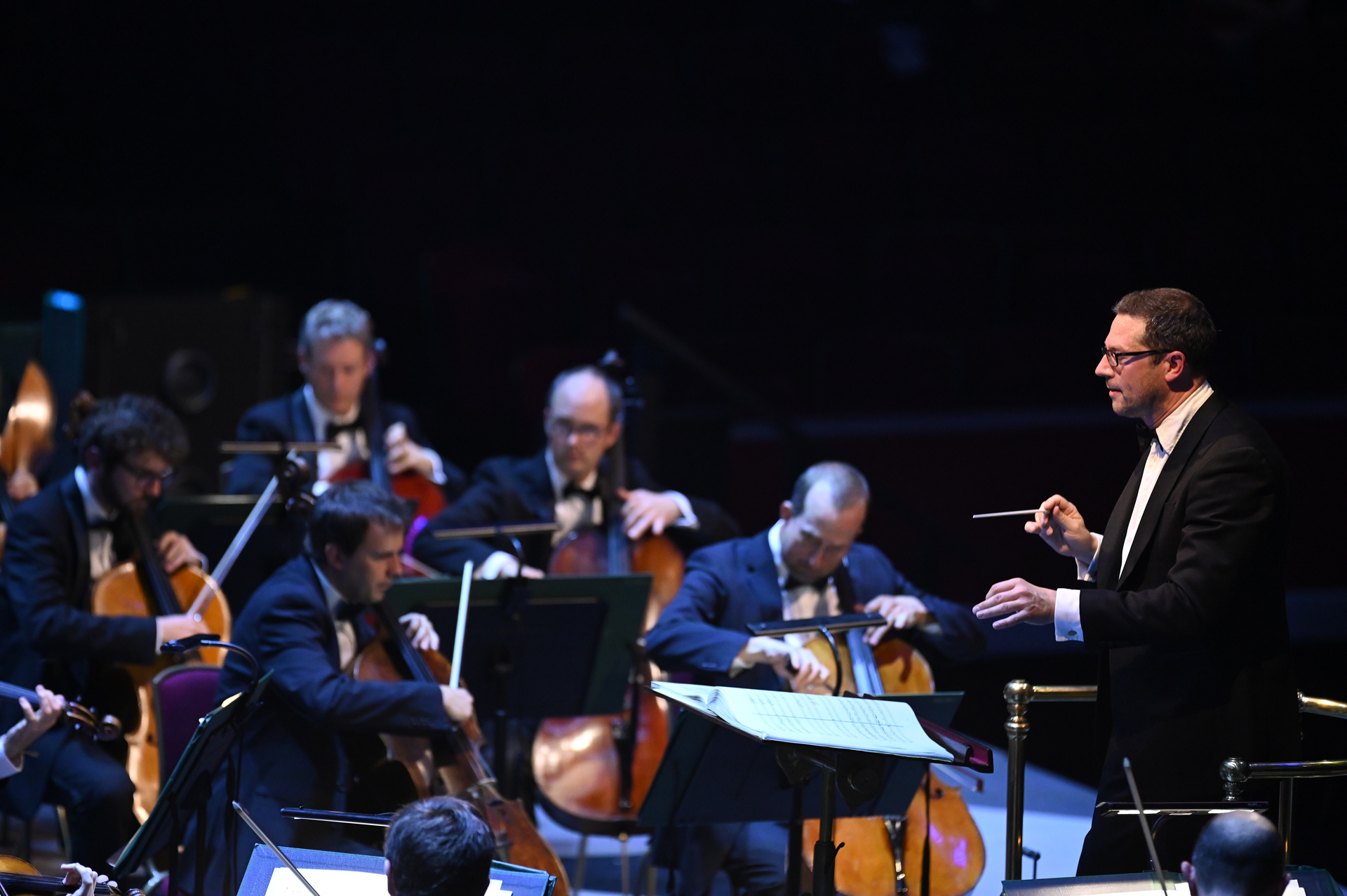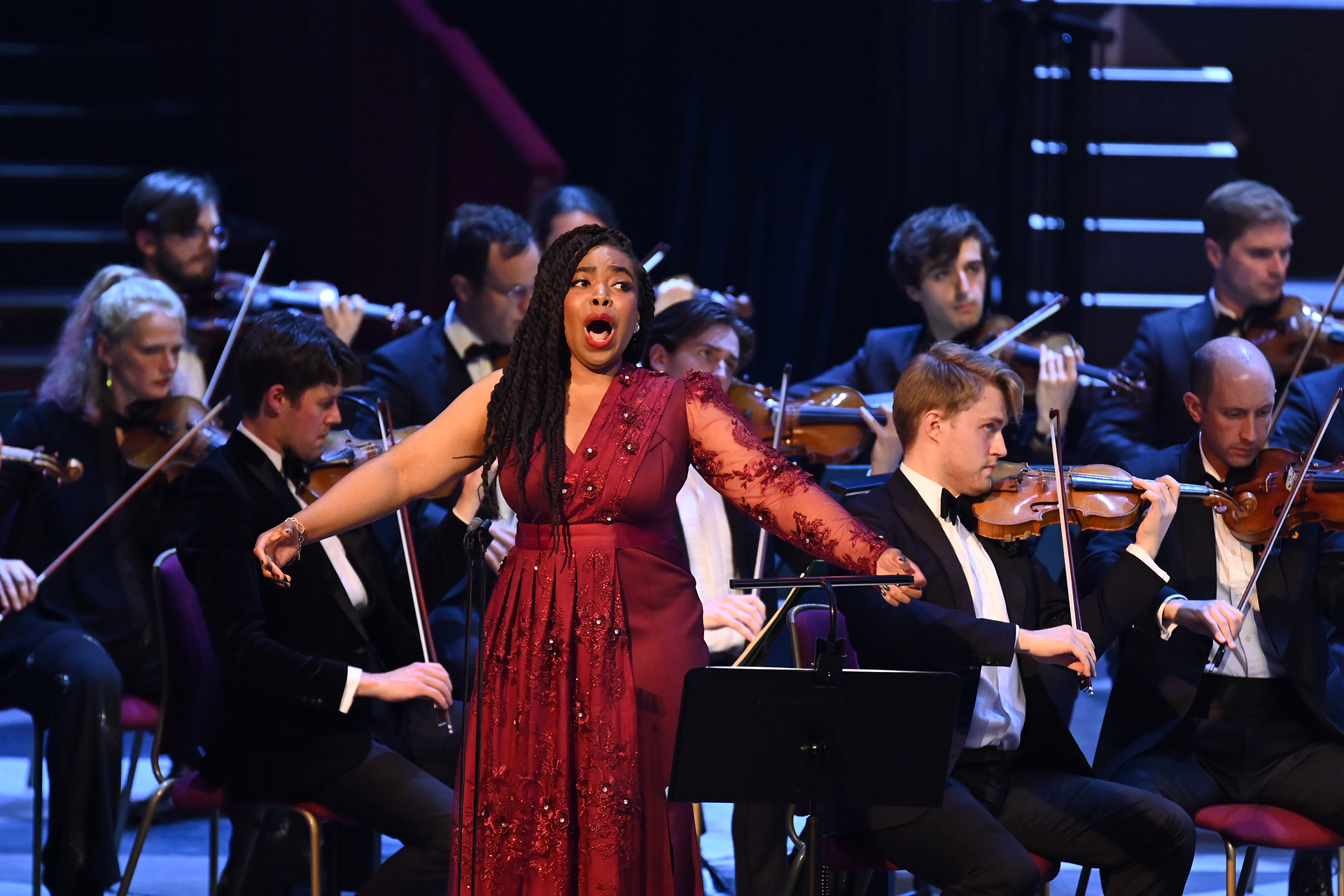Chiejina, Sinfonia of London, Wilson, BBC Proms review - a musical arrival for a special favourite | reviews, news & interviews
Chiejina, Sinfonia of London, Wilson, BBC Proms review - a musical arrival for a special favourite
Chiejina, Sinfonia of London, Wilson, BBC Proms review - a musical arrival for a special favourite
Arresting musicianship finally gives Korngold his due
Turns out John Wilson was playing the long game from the start. The dynamic British conductor eased his way into Proms schedules in 2007, establishing his John Wilson Orchestra as an annual festival fixture just two years later. Film music from the Golden Age of Hollywood, Broadway musicals, Bernstein and more all arrived gleaming – freshly polished and ready for their close-up.
The Proms debut of Wilson’s Sinfonia of London was always going to be one to watch. Resurrected in 2018 by Wilson (pictured below) as a project-based, recording ensemble – a super-orchestra bringing together the best of UK orchestral and chamber musicians – the Sinfonia of London has already clocked-up critical acclaim and awards for everything from Massenet to Respighi, Britten, Bax and more. But none have made more impact than the group’s first release: 2019’s recording of Erich Korngold’s Symphony in F sharp.

Having taken us all by the hand over nearly 15 years, painstakingly exposed the connections between today’s film-music and musical-theatre greats and their 20th-century forebears, Wilson here cashed in that education, taking his loyal Proms audience back to the point of intersection, the moment where post-Romantic innovation and entertainment were one.
The programme was an homage to Vienna – initially a whipped-cream vision in Johann Strauss, stretched and teased into new depth by Alban Berg’s Seven Early Songs, before waltzes lurch and implode in Ravel’s La Valse, dust clearing to reveal Korngold’s Symphony as a forked path ahead, one heading not just to Hollywood but also to the late 20th-century symphonists.
Whipping us onto the dance floor like some Teutonic young Karl or Stefan, ferociously immaculate in tie and tails, the Fledermaus overture twirled and spun us at a dizzying pace. Risk (real in the opening bars) settled into a thrilling illusion, a deadpan side drum cutting through the silky, whirling glamour of the strings with precise comic timing, woodwind soloists adding their own witty commentary.

Emerging out of the Debussyean, whole-tone haze at the start of “Nacht”, Chiejina’s mellow, liquid flow of sound surged and rippled, easy and unforced in this huge space. This was storytelling from within, voice just another line – sometimes exposed, sometimes concealed – within a constantly shifting orchestral texture: a smudgy chalk-drawing replacing the precision of Strauss’s opening pen and ink.
If the Berg took us outside time, Ravel’s La Valse was a jolt of awakening. With the memory of the Strauss still fresh, Wilson seemed to delight in darkening his palette, twisting iridescence into the unsettling whirr of flutter-tongued flutes and transforming propulsive, certain basslines into the grinding, ambiguous questions out of which Ravel’s death-dance emerges. With Covid restrictions still in place, big bands and big noises have been in short supply this season. Have we heard anything as violent, as apocalyptic as this climax? Even Aurora’s Firebird didn’t come close.

Wilson’s gift of sonic transformation gave us an orchestra whose glossy Hollywood strings now came with added steel. There was a wiriness here that refused to sink into Korngold’s tempting melodies; even the slow movement (its theme later borrowed for The Private Lives of Elizabeth and Essex) was strung taut, edgily beautiful, as though it might tumble off the tightrope at any moment.
The lack of sentimentality; the cool internal logic balanced by ferocity of delivery; the sheer seriousness of the whole thing: it was impossible not to be wowed. And not a Hollywood wow either – all feathers and diamante sparkle. This was the real deal – the climax of a musical argument Wilson has been making his entire career, and the arrival of a symphony never performed in public during its composer’s lifetime, but now – finally – taking its place.
rating
Explore topics
Share this article
Add comment
The future of Arts Journalism
You can stop theartsdesk.com closing!
We urgently need financing to survive. Our fundraising drive has thus far raised £49,000 but we need to reach £100,000 or we will be forced to close. Please contribute here: https://gofund.me/c3f6033d
And if you can forward this information to anyone who might assist, we’d be grateful.

Subscribe to theartsdesk.com
Thank you for continuing to read our work on theartsdesk.com. For unlimited access to every article in its entirety, including our archive of more than 15,000 pieces, we're asking for £5 per month or £40 per year. We feel it's a very good deal, and hope you do too.
To take a subscription now simply click here.
And if you're looking for that extra gift for a friend or family member, why not treat them to a theartsdesk.com gift subscription?
more Classical music
 BBC Proms: Barruk, Norwegian Chamber Orchestra, Kuusisto review - vague incantations, precise laments
First-half mix of Sámi songs and string things falters, but Shostakovich scours the soul
BBC Proms: Barruk, Norwegian Chamber Orchestra, Kuusisto review - vague incantations, precise laments
First-half mix of Sámi songs and string things falters, but Shostakovich scours the soul
 BBC Proms: Alexander’s Feast, Irish Baroque Orchestra, Whelan review - rapturous Handel fills the space
Pure joy, with a touch of introspection, from a great ensemble and three superb soloists
BBC Proms: Alexander’s Feast, Irish Baroque Orchestra, Whelan review - rapturous Handel fills the space
Pure joy, with a touch of introspection, from a great ensemble and three superb soloists
 BBC Proms: Moore, LSO, Bancroft review - the freshness of morning wind and brass
English concert band music...and an outlier
BBC Proms: Moore, LSO, Bancroft review - the freshness of morning wind and brass
English concert band music...and an outlier
 Willis-Sørensen, Ukrainian Freedom Orchestra, Wilson, Cadogan Hall review - romantic resilience
Passion, and polish, from Kyiv's musical warriors
Willis-Sørensen, Ukrainian Freedom Orchestra, Wilson, Cadogan Hall review - romantic resilience
Passion, and polish, from Kyiv's musical warriors
 BBC Proms: Faust, Gewandhausorchester Leipzig, Nelsons review - grace, then grandeur
A great fiddler lightens a dense orchestral palette
BBC Proms: Faust, Gewandhausorchester Leipzig, Nelsons review - grace, then grandeur
A great fiddler lightens a dense orchestral palette
 BBC Proms: Jansen, Royal Concertgebouw Orchestra, Mäkelä review - confirming a phenomenon
Second Prom of a great orchestra and chief conductor in waiting never puts a foot wrong
BBC Proms: Jansen, Royal Concertgebouw Orchestra, Mäkelä review - confirming a phenomenon
Second Prom of a great orchestra and chief conductor in waiting never puts a foot wrong
 BBC Proms: Royal Concertgebouw Orchestra, Mäkelä review - defiantly introverted Mahler 5 gives food for thought
Chief Conductor in Waiting has supple, nuanced chemistry with a great orchestra
BBC Proms: Royal Concertgebouw Orchestra, Mäkelä review - defiantly introverted Mahler 5 gives food for thought
Chief Conductor in Waiting has supple, nuanced chemistry with a great orchestra
 Dunedin Consort, Butt / D’Angelo, Muñoz, Edinburgh International Festival 2025 review - tedious Handel, directionless song recital
Ho-hum 'comic' cantata, and a song recital needing more than a beautiful voice
Dunedin Consort, Butt / D’Angelo, Muñoz, Edinburgh International Festival 2025 review - tedious Handel, directionless song recital
Ho-hum 'comic' cantata, and a song recital needing more than a beautiful voice
 Classical CDs: Dungeons, microtones and psychic distress
This year's big anniversary celebrated with a pair of boxes, plus clarinets, pianos and sacred music
Classical CDs: Dungeons, microtones and psychic distress
This year's big anniversary celebrated with a pair of boxes, plus clarinets, pianos and sacred music
 BBC Proms: Liu, Philharmonia, Rouvali review - fine-tuned Tchaikovsky epic
Sounds perfectly finessed in a colourful cornucopia
BBC Proms: Liu, Philharmonia, Rouvali review - fine-tuned Tchaikovsky epic
Sounds perfectly finessed in a colourful cornucopia
 BBC Proms: Suor Angelica, LSO, Pappano review - earthly passion, heavenly grief
A Sister to remember blesses Puccini's convent tragedy
BBC Proms: Suor Angelica, LSO, Pappano review - earthly passion, heavenly grief
A Sister to remember blesses Puccini's convent tragedy
 BBC Proms: A Mass of Life, BBCSO, Elder review - a subtle guide to Delius's Nietzschean masterpiece
Mark Elder held back from blasting the audience with a wall of sound
BBC Proms: A Mass of Life, BBCSO, Elder review - a subtle guide to Delius's Nietzschean masterpiece
Mark Elder held back from blasting the audience with a wall of sound

Comments
Last night was a great